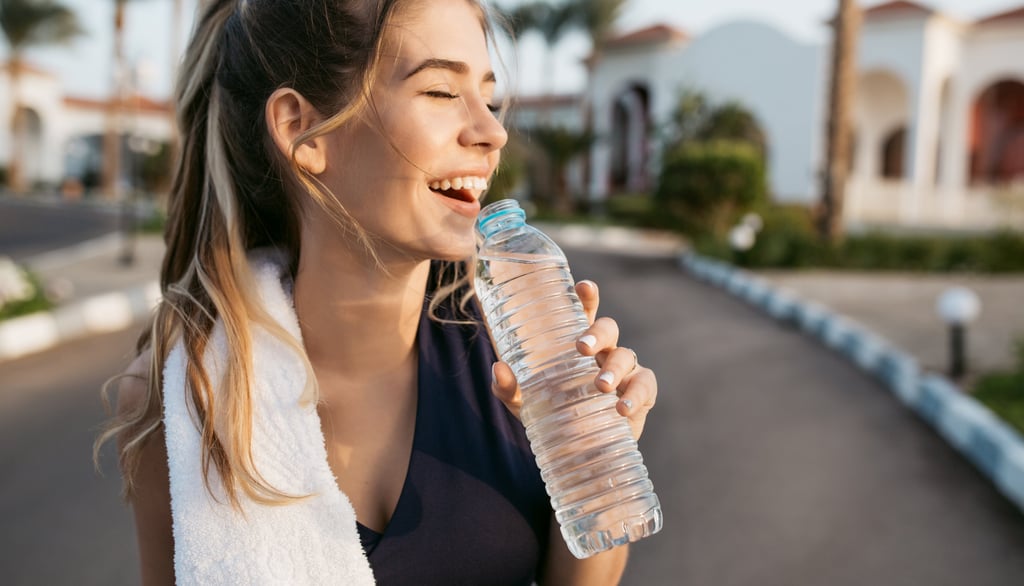Is drinking water good for you? Discover the benefits and what science says
Find out why drinking water every day is essential for your health! See the main benefits of hydration, how water helps with weight loss, the ideal amount per day, whether it is good to drink before bed and which tests require a water fast. Understand everything in a simple and practical way!
NUTRIÇÃO
Escolha Mast
5/6/20253 min read


Is drinking water good for you? Discover the benefits and what science says
Have you ever stopped to think about how a simple glass of water can transform your health? Drinking water is such a common act that we often forget its true value. However, proper hydration is one of the most powerful attitudes to keep the body healthy, prevent diseases and even help with weight loss.
In this article, you will understand:
Why drinking water is essential for the human body;
How many liters per day are recommended;
If it is healthy to drink water before going to bed;
How water helps in the weight loss process;
Which exams require a water fast and why.
Keep reading and find out why drinking water is a habit that can change your life!
Why drinking water is essential for health?
Water is the main component of the human body. About 60% of our body weight is made up of water (Institutos Nacionais de Saúde (NIH) | Transformando a descoberta em saúde). It participates in almost all vital functions, such as:
Regulation of body temperature;
Transportation of nutrients and oxygen to cells;
Lubrication of joints;
Elimination of toxins through the kidneys and skin;
Digestion and absorption of food.
Becoming dehydrated, even slightly, can cause headaches, fatigue, constipation and difficulty concentrating. In the long term, a lack of water can overload the kidneys and increase the risk of kidney stones and urinary infections.
How many liters of water should I drink per day?
The ideal amount of water varies according to weight, age, physical activity and climate. However, a widely used rule of thumb is:
📌 Drink about 35 ml of water per kilo of body weight.
For example:
A person weighing 70 kg should consume approximately 2.4 liters of water per day.
Someone weighing 50 kg needs about 1.7 liters.
The World Health Organization recommends an average of 2 to 3 liters per day for healthy adults. But be careful: this amount also includes the water present in foods (fruits, soups, vegetables, etc.).
Does drinking water help you lose weight?
Yes! Water can be a great ally for those who want to lose weight in a healthy way. Here's how:
1. Reduces appetite
Drinking a glass of water before meals helps to "trick" the stomach, promoting greater satiety and making you eat less.
2. Speeds up metabolism
Studies show that drinking 500 ml of water can increase metabolism by up to 30% for one hour (The Journal of Clinical Endocrinology & Metabolism, 2003).
3. Prevents fluid retention
When the body is dehydrated, it tends to retain more water as a defense mechanism, which causes swelling. Staying hydrated stimulates the kidneys to function better, eliminating excess sodium and toxins.
4. Replacing high-calorie drinks
Replacing soft drinks, artificial juices and alcoholic beverages with water drastically reduces your calorie intake.
💡 Practical tip: Start your day with a glass of warm water with lemon. In addition to stimulating the intestines, it helps to alkalize the body and strengthens the immune system.
Can you drink water before bed?
Yes, you can, but in moderation. Drinking a small glass of water (about 150 to 200 ml) before bed can:
Help regulate body temperature during the night;
Avoid nighttime dehydration, especially on hot days or after physical exercise.
⚠️ However, it is important to avoid overdoing it. Drinking too much water before bed can disrupt your sleep, as it increases the urge to urinate during the night.
Which tests require fasting from water?
Although most blood tests allow water intake, some require complete fasting, including from liquids. This is because even water can interfere with certain results.
Tests that may require fasting from water:
Total abdominal ultrasound: requires complete fasting to avoid gas formation and to clearly visualize the organs.
Upper digestive endoscopy: the stomach must be completely empty, including of water.
Sedation exams: such as colonoscopy, in some cases, require absolute fasting, under medical supervision.
Exams that allow drinking water:
Common blood tests (blood sugar, cholesterol, blood count): generally allow pure water, in small quantities.
Urine and stool tests: do not require complete fasting from liquids.
✅ Always follow the recommendation of the laboratory or health professional. If in doubt, call before taking the exam.
Final tip: how to create the habit of drinking more water?
Creating the habit of drinking water can be challenging, but with small strategies, everything becomes easier:
Always keep a bottle nearby;
Use reminder apps;
Add flavor with lemon, mint or cucumber slices;
Associate the act of drinking water with times of the day (e.g.: when waking up, before meals, after going to the bathroom, etc.).
Remember: your body speaks! Dry mouth, very yellow urine, fatigue and dizziness are signs that you may be dehydrated.
Conclusion
Drinking water is a simple, free and powerful action. It improves digestion, helps with weight loss, promotes organ health, combats swelling and even prevents diseases. Don't wait until you feel thirsty to hydrate yourself: thirst is a late sign of dehydration.
Include water in your routine as a true natural remedy. Your body will thank you — and so will your health!
🌱 Take care of yourself. Small actions generate big changes.
💧 And it all starts with a glass of water.
ESCOLHA MAST
Escolha Mast is an informative website that publishes blog posts and also promotes products that can help you in your quest for health and well-being.
CONTACT INFORMATION
Email: escolhamast@gmail.com
Phone: +55 068 99981-0331
© 2025. All rights reserved to Escolha Mast.
Choose to live well!
